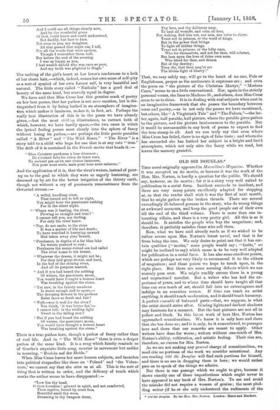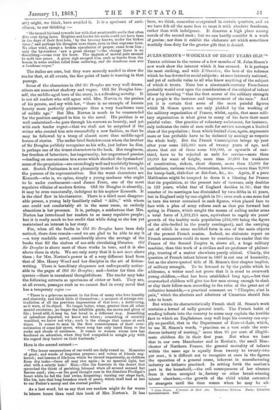OLD SIR DOUGLAS.*
Tars novel originally appeared in Macmillan's Magazine. Whether it was accepted on its merits, or because it was the work of the Hon. Mrs. Norton, is hardly a question for the public. We should say, however, on its merits ; for it is a story very well suited to publication in a serial form. Incident succeeds to incident, and there are very many points excellently adapted for stopping at, so that the reader shall wish it was the first of next month, that he might gather up the broken threads. There are several exceedingly ill-behaved persons in the story, who do wrong things at awkward moments, and keep the good people out of their own till the end of the third volume. There is more than one in- teresting villain, and there is a very pretty girl. All this is as it should be. It satisfies the people who buy the magazines ; and, therefore, it probably satisfies those who sell them.
Now, what we have said already reads as if we wished to be rather severe upon Mrs. Norton's latest novel, and that is far from being the case. We only desire to point out that it has cer- tain qualities (" merits," some people would say ; "faults," we might be inclined to Bay) which cause is to be very well adapted for publication in a serial form. It has also some excellent points, which are perhaps not very likely to recommend it to the editors of magazines ; and these points we hope to touch upon, in the right place. But there are some seeming defects which we can scarcely pass over. We might readily excuse them in a young and unpractised novelist. But a writer who has had the ex- perience of years, and to whom time should have taught all that time can ever teach of art, should fall into no extravagance and indulge in no sensation scenes. If time can teach an artist anything, it should teach moderation, and it should teach harmony. A perfect ensemble of balanced parts—that, we suppose, is what the artist should strive after. Glaring lights and darkest shadows may fascinate for a moment. But the best pictures are not all in yellow and black. 'In this latest work of hers Mrs. Norton has approached sensationalism. We know it is only here and there that she has done so ; and it is only, be it remembered, to passages here and there that our remarks are meant to apply. Other writers have done far worse ; writers without one-tenth of Mrs. Norton's ability, cultivation, and artistic feeling. Their sins are, therefore, no excuse for Mrs. Norton.
As we are not making any general charge of sensationalism, we need cite no portions of the work we consider sensational. Any one reading Old Sir Douglas will find such portions for himself, and there is no use in dragging them in here ; we would rather pass on to speak of the things we admire.
But there is one passage which we ought to give, because it shows exactly one of those imperfections which ought never to have appeared in any book of Mrs. Norton's. To see and avoid the mistake did not require a woman of genius ; the most plod- ding writer (if he or she only understood the rudiments of the
* Old Sir Douglas. By the Hon. Mrs. Norton. London: Hurst and Blacken..
art) might, we think, have avoided it. It is a specimen of anti- climax, to our thinking :—
" He turned his head towards her with that unutterable smile that often flits over dying faces. Brighter and fonder his smile could not have been in the days of their first love, by the broomy knows, under the birken trees ;' and perhaps his thoughts were there, even in that supreme hour. No other word, except a broken ejaculation of prayer, came from him ; only the bystanders saw a great change '—the change there is no describing—come over his brow. The anguish of mortal pain seemed to melt into peace. A great sigh escaped him, such as bursts from the bosom in some sudden relief from suffering, and the handsome man was a handsome corpse."
The italics are ours, but they were scarcely needed to show the reader that, at all events, the fine point of taste is wanting in that passage.
Some of the characters in Old Sir Douglas are very well drawn, others are somewhat shadowy and vague. Old Sir Douglas him- self, the middle-aged hero of the story, is a refreshing novelty. It is not all readers who will agree with Mrs. Norton in the praises of his person, and say with her, "there is no example of human beauty more perfectly picturesque than a very handsome man of middle age." But Mrs. Norton is much to be commended for the position assigned to him in the novel. His position is so well maintained—he goes through his sorrows so bravely, and yet with such tender regret—that we shall not be surprised if the writer who created him sets successfully a new fashion, so that he may be followed by a troop of almost more than middle-aged
-heroes of stories. The under-bred Scotchwoman whom the brother of Sir Douglas publicly recognizes as his wife, just before he dies, is perhaps one of the truest characters in the book. Her roughness,
her freedom of behaviour, her impetuosity, her ungoverned passion —leading on one occasion to a scene which shocked the bystanders' sense of the proprieties—are exceedingly-well and truthfullybrought out. Scotch Puritanism is not pleasantly treated in the novel, in the persons of its representatives. But the worst characters are .
Kenneth—who is, we opine, simply a young madman who ought to be under confinement—and James Frere, one of the most repulsive villains of modern fiction. Old Sir Douglas is absurdly, it may be even unnaturally, indulgent to his nephew Kenneth. It is the chief flaw in his character. There is a third most disagree- able person, a young lady familiarly called " Affie," with whom -one could not comfortably sit in the same room, so entirely obnoxious is her presence. It is, perhaps, a misfortune that Mrs.
Norton has introduced her readers to so many repulsive people ; but it is really much to her credit that while doing so she has yet maintained an interest in her story.
For, when all the faults in Old Sir Douglas have been duly noticed, there does remain—and we are glad to be able to say it —a very readable novel, considerably above the average of the books that fill the shelves of sea-side circulating libraries. Old Sir Douglas is above most of these works in tone, and it is also above them in style. We are only sorry that it is not more above them ; for Mrs. Norton's power is of a very different kind from that of Mrs. Henry Wood and her disciples in the art of fiction- writing. There is hereditary eloquence not unfrequently notice- able in the pages of Old Sir Douglas; and—better far than elo- quence—there is occasional thoughtfulness. The reader may take the following extracts as specimens of either or both. They are, at all events, passages such as we cannot find in every novel that has a temporary vogue :—
" There is a grievous moment in the lives of many who love humbly and sincerely, and think little of themselves ; a moment of strange con- tradiction of all the previous impressions of that love ; a dethroning, as it were, of its object. No longer better, wiser, greater than all other mortal creatures ; ,no longer the infallible guide, the crown and glory of life ; loved still, it may be, but loved in a different way. Something of splendour departed, we know not where ; something of security vanished, we know not why ; such is the change that comes at such times. It comes to men in the first consciousness of their over- estimation of some fair Byron, whose song has only lured them to the rocks and shoals of existence. It comes to women whose love has bordered on adoration, when they feel compelled to mingle pity with the regard they bestow on their husbands."
Here is the second extract :— "The lesser resurrections of our world are daily round us. Memories of good ; and words of forgotten prayers ; and voices of friends neg- lected; and lessons of life from which we turned impatiently, as children from dry tasks—these all may rise again ; in no spectral light, but clad with a saintly halo 1 Rise,—like the fountain in the desert that quenched the thirst of perishing Ishmael when all around seemed but barren sand; rise,—as the good thought rose in the dissolute Prodigal's heart while he fed the foul swine, despairing; turning our steps back, like his, into that long forsaken track of peace, which shall lead at last to our Father's mercy and the eternal pardon."
As a last word, let us say that our readers might do far worse in leisure hours than read this book of Mrs. Norton's. It has been, we think, somewhat overpraised in certain quarters, and so we have felt all the more free to treat it with absolute frankness, rather than with indulgence. It deserves a high place among novels of the second rank ; but we can hardly consider it a work of genius ; nor does it exhibit the elaborate art which sometimes worthily does duty for the greater gift that is denied.































 Previous page
Previous page